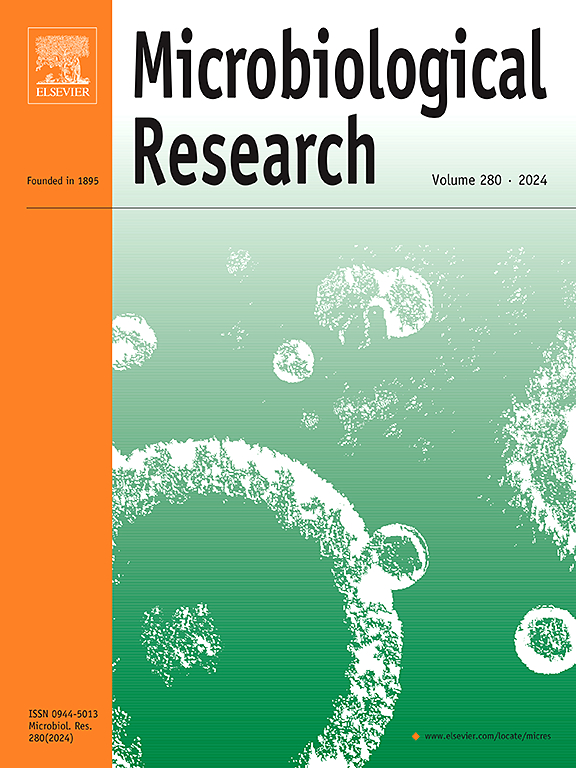Synergistic effect of Adathoda vasica plant-derived biostimulant and PGPR on Zea mays L. for drought stress management
IF 6.1
1区 生物学
Q1 MICROBIOLOGY
引用次数: 0
Abstract
Drought is a significant abiotic stress that adversely affects the physiological and biochemical processes in crops, posing a considerable challenge to agricultural productivity. The present study explored the efficacy of plant-derived biostimulant (PDB) and plant growth-promoting rhizobacteria (PGPR) strains Pseudomonas putida (RA) and Paenibacillus lentimorbus CHM12) in the management of negative impacts of drought stress in Zea mays (maize). Adathoda vasica leaf extracts (ADLE) emerged as the most potent biostimulant of the seven evaluated medicinal plant extracts. The synergetic effect of ADLE and RA enhances plant vegetative growth (root length, shoot length, fresh weight and dry weight) as well as significantly modulates drought-induced oxidative stress, as indicated by higher chlorophyll content and increased sugar and phenolic levels and reduction of proline level. The expression of defence-related (ZmAPX, ZmSOD, and ZmCAT) and transcription factor (ZmNAC, ZmWRKY, and ZmMYB) genes further supported the beneficial effects of this synergism under drought conditions. Furthermore, metabolite profiling through GC-MS analysis showed significant alterations in metabolites such as glucose, galactose, mannose, hexopyranose, linolenic acid, hexadecenoic acid, and butanedioic acid when PDB and PGPR were applied together. Overall, the findings of the present study affirm that the combined application of plant-derived biostimulant ADLE and plant-beneficial rhizobacteria RA can effectively alleviate the adverse effects of drought on maize, providing an eco-friendly and sustainable solution for improving productivity under stress.
Adathoda vasica 植物源生物刺激剂和 PGPR 对玉米干旱胁迫管理的协同效应。
干旱是一种严重的非生物胁迫,会对农作物的生理和生化过程产生不利影响,给农业生产带来巨大挑战。本研究探讨了植物源生物刺激剂(PDB)和植物生长促进根瘤菌(PGPR)菌株假单胞菌(RA)和Paenibacillus lentimorbus CHM12在管理玉米干旱胁迫负面影响方面的功效。Adathoda vasica 叶提取物(ADLE)是七种受评估药用植物提取物中最有效的生物刺激剂。ADLE 和 RA 的协同作用增强了植物的无性生长(根长、芽长、鲜重和干重),并显著调节了干旱引起的氧化应激,表现为叶绿素含量增加、糖和酚含量增加以及脯氨酸含量降低。防御相关基因(ZmAPX、ZmSOD 和 ZmCAT)和转录因子(ZmNAC、ZmWRKY 和 ZmMYB)的表达进一步证实了这种协同作用在干旱条件下的有益效果。此外,通过 GC-MS 分析进行的代谢物分析表明,当 PDB 和 PGPR 同时应用时,葡萄糖、半乳糖、甘露糖、六吡喃糖、亚麻酸、十六碳烯酸和丁二酸等代谢物发生了显著变化。总之,本研究的结果肯定了联合应用植物源生物刺激剂 ADLE 和植物有益根瘤菌 RA 能有效缓解干旱对玉米的不利影响,为提高胁迫下的生产力提供了一种生态友好和可持续的解决方案。
本文章由计算机程序翻译,如有差异,请以英文原文为准。
求助全文
约1分钟内获得全文
求助全文
来源期刊

Microbiological research
生物-微生物学
CiteScore
10.90
自引率
6.00%
发文量
249
审稿时长
29 days
期刊介绍:
Microbiological Research is devoted to publishing reports on prokaryotic and eukaryotic microorganisms such as yeasts, fungi, bacteria, archaea, and protozoa. Research on interactions between pathogenic microorganisms and their environment or hosts are also covered.
 求助内容:
求助内容: 应助结果提醒方式:
应助结果提醒方式:


